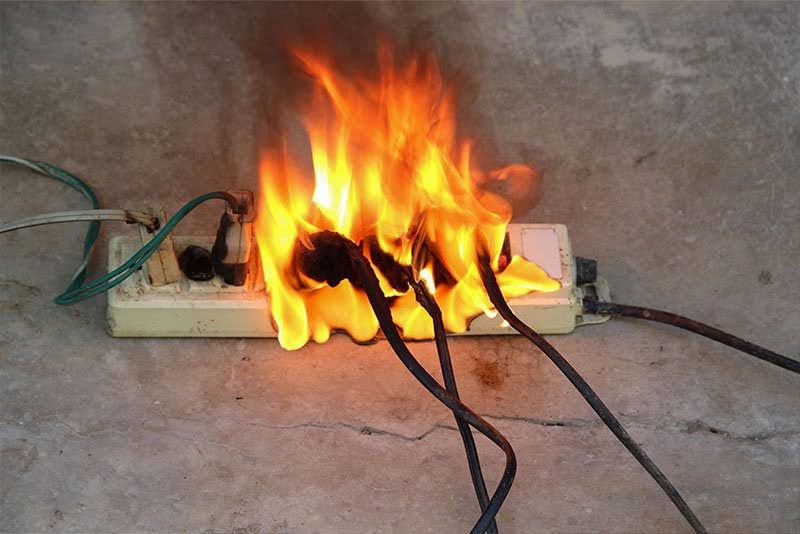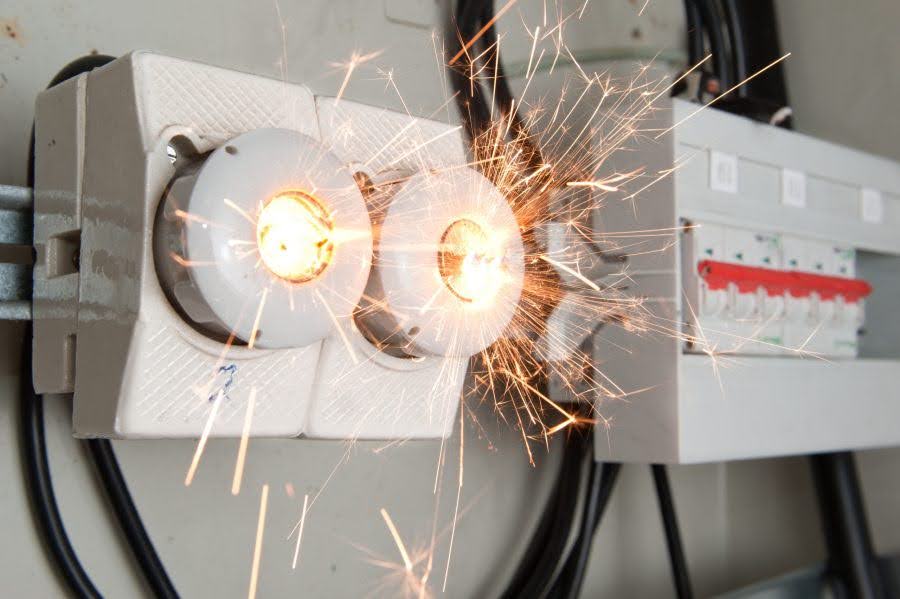Electrical fires pose a significant threat to homes and businesses, often striking without warning and causing devastating damage. These incidents not only jeopardize property but also put lives at risk. This makes them a critical concern for homeowners, building managers, and safety professionals alike.
This article dives into what can cause electrical fires, exploring both common and lesser-known culprits. Understanding the root causes of electrical fires is crucial for prevention and risk mitigation.
By shedding light on the underlying issues, we aim to empower readers with the knowledge to identify potential risks in their own environments and take proactive steps to ensure electrical safety.
What Can Cause Electrical Fires?
As you know, electrical fires can be life-threatening. Faulty electrical outlets and wiring, overloaded circuits, malfunctioning appliances, poorly installed electrical devices, and faulty outlets are among the most common causes of electrical fire.
In this section, we explore the various factors that can lead to electrical fires. Learn about what would cause an outlet to catch fire and other potential ignition sources. Understanding these risks is crucial for maintaining a safe living environment and preventing devastating incidents.
Faulty Electrical Outlets and Wiring
Worn-out electrical outlets can be dangerous. They may have loose connections that can overheat and start fires. Old wiring in homes, especially those built before 1970, might not be able to handle modern electrical needs safely.
This can lead to overheating and fires too. Watch out for signs of electrical problems like flickering lights, buzzing sounds from outlets, or scorch marks. If you notice these, call an electrician right away to prevent fires.
Overloaded Circuits and Extension Cords
Using too many devices on one circuit can overload it, causing it to heat up and potentially start a fire. It’s risky to run several high-power appliances on the same circuit. They can make the circuit breaker trip, and if it fails, it might lead to overheating and fires.
Extension cords aren’t meant for long-term use. They can overheat if used for powerful appliances or if they’re damaged. Use them carefully and replace any that show signs of wear.

Outdated or Faulty Electrical Appliances
Old appliances can develop problems like frayed cords or worn-out parts, which can cause fires. Be careful with fake appliances too. They might not meet safety standards and can be fire hazards. Keep your appliances in good shape by cleaning them regularly and checking for any loose parts.
This helps prevent overheating and extends the life of your appliances. Replace appliances immediately if they show signs of serious damage, such as burning smells or frequent malfunctions. Always ensure they are plugged into properly grounded outlets to minimize risk.
Improper Use of Electrical Devices
Using electrical devices in ways they weren’t meant for can be dangerous. For example, using indoor appliances outside can lead to water damage and short circuits.
Damaged cords are very risky – they can cause sparks or short circuits that start fires. Always follow the instructions that come with your electrical devices. This keeps you safe and ensures your devices work properly.
Portable Heaters and Heating Devices
Space heaters can easily cause fires if not used carefully. They use a lot of power and get very hot. Keep them away from anything that can burn and never leave them on when you’re not in the room.
Put heaters on flat surfaces where they won’t tip over. Look for heaters with safety features like automatic shut-off if they fall over. These features help prevent fires.
Light Fixtures and Light Bulbs
Using bulbs that are too powerful for a light fixture can cause overheating and potentially start a fire. Always check the fixture’s maximum wattage capacity. Avoid covering lamps or light fixtures with fabric or other materials, as this can trap heat and increase fire risk.
Keep your light fixtures clean and inspect them regularly for loose parts to ensure safe and efficient operation. When replacing bulbs, consider energy-efficient LED options. These not only consume less power but also generate less heat, further reducing fire hazards while lowering your energy bills.
Electrical Wiring in Wet or Damp Areas
Bathrooms and kitchens need special care with electrical wiring because water and electricity don’t mix safely. Water can cause short circuits, which can lead to fires.
Use special outlets called GFCIs in these areas. They shut off the power quickly if there’s a problem, which helps prevent shocks and fires. Keep electrical devices away from water, and don’t use them with wet hands.
Electrical Malfunctions and Short Circuits
Short circuits happen when electricity flows where it shouldn’t, like when wires touch each other or when water creates a new path for electricity. This can cause sparks and fires.
Loose connections, damaged wires, and overloaded circuits can all cause electrical problems. If you notice frequent power trips or smell burning, get help from an electrician right away. Taking care of small problems quickly can prevent big, dangerous ones later.

Preventive Measures and Safety Tips
- Schedule professional electrical inspections regularly and perform monthly visual checks for wear or damage.
- Avoid overloading circuits by spreading high-power appliances across different outlets and using smart power strips.
- Keep appliances away from water sources, ensure good airflow, and unplug them when not in use.
- Install smoke and carbon monoxide detectors in every room and near sleeping areas, testing them monthly.
- Use extension cords only temporarily, not as permanent wiring, and replace any damaged cords immediately.
Conclusion
Electrical fires pose a significant threat to our homes and businesses, but they are largely preventable with proper awareness and precautions. Knowing about potential hazards like faulty outlets, overloaded circuits, appliance misuse, and wet area wiring is vital for safeguarding environments.
By exploring what can cause electrical fires, we empower ourselves to take proactive steps in fire prevention. Regular inspections, proper maintenance, and adherence to safety guidelines can dramatically reduce these risks.
Remember, electrical safety is an ongoing commitment. Stay informed, stay cautious, and don’t hesitate to seek professional help when in doubt. Your proactive approach to electrical safety could be the key to preventing a devastating fire.


